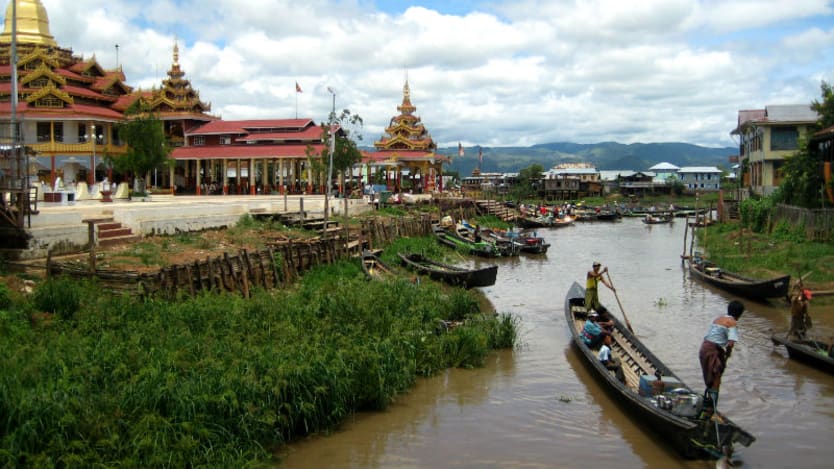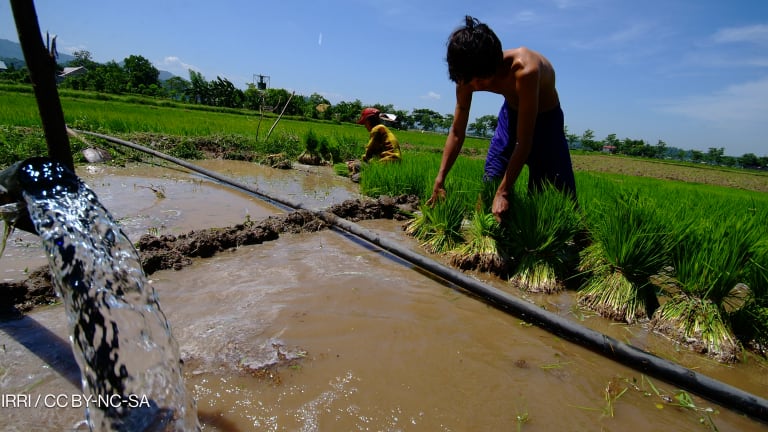
Access to water is crucial. For riverine communities, in particular, access to waterways is vital for every aspect of life, from food security to trade and navigation. With 10 river basins with a combined surface water potential of 1,000 cubic kilometers, Myanmar’s waterways are a lifeline for the communities that rely on them. At the same time, they are attractive to investors due to their huge combined 100-gigawatt hydropower potential, the region’s highest.
Foreign aid agencies are knocking on the door of Myanmar’s government, industries and community organizations. The recent surge in development aid pouring into Myanmar saw a nearly 800 percent increase in 2013 from 2012, according to the Organization for Economic Cooperation and Development. Companies are also queuing up to invest; many of which are interested in developing Myanmar’s water resources.
International organizations want to help Myanmar eradicate poverty; and the private sector wants to build industry that will develop the economy and connect the country to the region. With limited policy and regulation, how can the private and public sectors work together better to help secure the investments Myanmar needs develop its waterways, and in doing so, eradicate poverty and set new standards?
Establishing institutions, policies and regulation
A holistic approach that aims to ensure water resources are developed sustainably is needed. To achieve this, the International Finance Corp. and others are working closing with the government to improve much needed policy and regulation. There’s work to be done with companies to improve their standards and lower risk; and regional financial institutions need support to help improve their lending practices. If we make a change with these key players and create strong policy, we will set new standards in Myanmar’s hydropower sector and attract higher quality investments.
Read related stories:
► Myanmar's development progress at stake as historic polls conclude
► The clean water and sanitation crisis: How we can do better
► In flood-stricken Myanmar, a new role for development partners
To make this work, Myanmar needs to improve its institutions for the sector to attract the right investors. Change is coming from within as the government works steadily to improve its knowledge of what it takes to build a hydropower sector that meets good international and industry practices. The Myanmar government is committed to training their officials every two to three months to build capacity and better understand international standards to develop and implement their new policies and guidelines.
Over time we believe that a commitment to learn will change perspectives. Achieving sustainability will become less daunting and progress will be made.
Policy and regulation is in an early stage in Myanmar. It’s a challenge that could be turned into an opportunity setting new standards for regional water and hydropower governance, beginning with improving trust and engagement of stakeholders. As we know, dialogue with stakeholders is critical. In our all of our work in Myanmar we need to plan how to best engage all stakeholders and strengthen partnerships with those that our work affects most.
Myanmar’s vibrant civil society should bolster — not hinder — stakeholder dialogues and community inclusion to make hydropower more sustainable and equitable. Nongovernmental organizations can take a lead and support the private sector with this.
Finding responsible investors
International organizations and NGOs also play a role in attracting responsible investors. With access to communities and an understanding of their needs, NGOs are able to provide civil society with access to information and advocate for greater stakeholder engagement. On the flip side, organizations can help companies better understand affected communities’ concerns and needs.
If the goal is to get the private sector on board, we need to speak their language. International organizations and NGOs need to prove that there is a business case for companies to raise their environmental and social standards and invest in lowering their impact. IFC and others advocate that there is a business case for investing in environmental and social risk management upfront, and that development can be sustainable, but we need more organizations — especially those that link closely with civil society speaking in terms that the private sector understands and responds to.
It is vital that Myanmar chooses responsible investors who support appropriate environmental and social standards and develop water resources sustainably. We need to begin to better understand Myanmar’s river basins and their important environmental and social characteristics.
Focusing on sustainability
Strategically, the government needs to identify which projects are most feasible from a sustainability perspective. This will involve commissioning a countrywide strategic environmental assessment that will inform the government’s decisions and further to develop guidance that provides companies with clear environmental and social responsibilities.
Sustainable development and management of Myanmar’s water resources is not the sole responsibility of the government. All stakeholders need to step up and cooperate, including the private sector. Achieving sustainability isn’t simple, and it does not happen alone. Companies need more support to help them address their sustainability challenges to ensure long-term business growth. The private sector is making progress on this in Myanmar through the formulation of a Hydropower Developers’ Working Group.
There are clear advantages for companies that manage their risks and achieve good practice. Companies that invest in risk management and sustainable business practices have improved their public reputation; worker retention; avoided accidents and environmental disasters; are trusted among stakeholders; and have more access to international financing that prioritizes these values.
As Myanmar’s water resources start to be tapped, they deserve high-quality investments that have an interest in lowering environmental and social risks. To make this work, Myanmar’s development community needs to work together to help develop the policy needed, and support the private sector achieve new standards.
Join the Devex community and access more in-depth analysis, breaking news and business advice — and a host of other services — on international development, humanitarian aid and global health.








